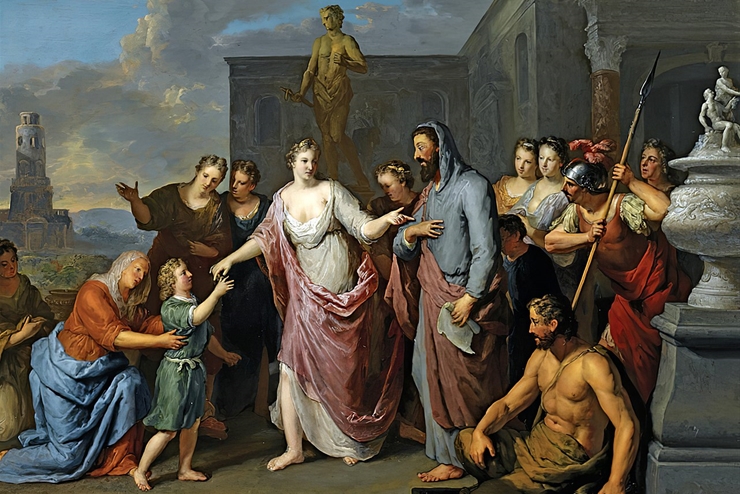The Politics may be the most influential study of political theory and political practice ever written.
Aristotle put the book together while investigating different regimes in the Greek world and elsewhere. The philosopher denies the existence of an ideal government applicable to all societies; instead, he looks at various governments that are appropriate for different peoples in different situations.
 Monarchies and mixed regimes that combine democratic and oligarchic features are said to offer stability for most Greek societies, but Aristotle also believes the Greek world can aim at aristocracy (literally rule by the most capable) and the polis, a regime in which those who are governed also govern their fellow-citizens. In Books Seven and Eight we learn about a hypothetical ideal regime and about how the young would be educated to uphold it. This construction too derives from the Greek ideal of self-rule.
Monarchies and mixed regimes that combine democratic and oligarchic features are said to offer stability for most Greek societies, but Aristotle also believes the Greek world can aim at aristocracy (literally rule by the most capable) and the polis, a regime in which those who are governed also govern their fellow-citizens. In Books Seven and Eight we learn about a hypothetical ideal regime and about how the young would be educated to uphold it. This construction too derives from the Greek ideal of self-rule.
In The Politics there is a detailed discussion of the excellence (arete) that is essential for holding political office. In Book One, for example, Aristotle focuses on the household (oikonomia), as the smallest governing unit. The male head of the household should exhibit virtues and strengths related to his custodial tasks, which are directing his slaves “despotically,” and guiding his wife and children in a “benevolent kingly manner.” Each role requires a skill or “disposition,” while the overall supervisory work should be conducive to human fulfillment within a community, according to our inborn qualities.
According to Aristotle, we become more fully human by participating in fellowship with others, although the philosopher does not discount what seem natural inequalities among humans, for example, between genders and diverse cultures. Not all people therefore should be allowed to hold the same positions in political societies or even in the household.
As to the question of whether Aristotle was politically correct, the answer is an unequivocal “no.” He thought Greeks were inherently different from Persians and other barbarians, as seen partly in their differing capacities to determine their forms of government. Moreover, in Book One, Aristotle stresses the “imperfections” of women, which require them to happily accept the moral guidance of their husbands.
Although some modern interpreters have tried to reconcile Aristotle with contemporary democratic values, it is hard to find convincing evidence that Aristotle really believed in gender equality or was a harsh critic of slavery (even if he criticized the practice by which Greeks took other Greeks as slaves in battle).
What makes Aristotle’s view of political life so remarkable is its total differentness from current political attitudes. Not surprisingly, it furnished the template for medieval and early modern European defenses of monarchical authority and was embedded in the corporate view of society found in thinkers from Thomas Aquinas to the 17th-century defender of royal prerogative, Robert Filmer.
Although there have been various attempts to “democratize” Aristotle, it may be necessary to understand the very circumscribed form in which Aristotle understood self-rule. It was an exercise in political autonomy practiced by a culturally homogeneous group made up of male-dominated households. Remnants of this Aristotelian model can still be found in early American society and in the traditional Swiss Republic. But trying to relate Aristotle’s concept of a viable democracy to current political preferences would be a bit of a stretch.
 Of particular use to us, however, is Aristotle’s insistence that the same form of rule is not applicable to all peoples. Efforts to export regimes to different cultures was, from Aristotle’s perspective, an invitation to disaster.
Of particular use to us, however, is Aristotle’s insistence that the same form of rule is not applicable to all peoples. Efforts to export regimes to different cultures was, from Aristotle’s perspective, an invitation to disaster.
Also instructive is Aristotle’s treatment of the derailing of governments (parekbaseis ton politeion), a problem that comes up in the middle books of The Politics. While monarchy, aristocracy, and a qualified democracy (as seen in the polis or in a mixed regime) can all furnish stability and contribute to human development, regimes necessarily deteriorate. They move gradually but ineluctably toward tyranny.
The question then arises about how to reverse this process of derailment so that one can move back toward a more tolerable political organization. Not surprisingly, this problem for Aristotle was almost peculiarly Greek, since he thought non-Greeks would live, with few exceptions, in despotic conditions. This would be “natural” for these peoples, just as self-rule or wise monarchical governments was for the Greeks an attainable ideal.
Image Credit:
above: Olympias presenting the young Alexander the Great to Aristotle by Gerard Hoet before 1733 [via Wikimedia Commons, in the Public Domain]

Leave a Reply